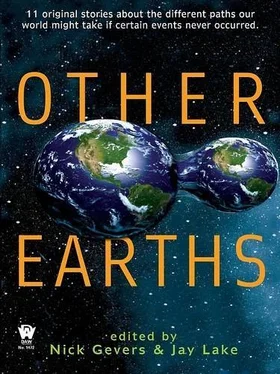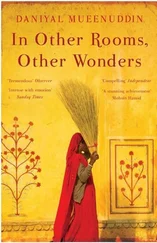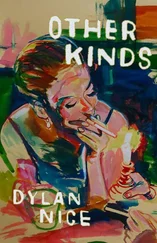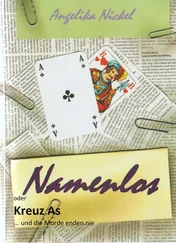Other Earths
An anthology of stories edited by Nick Gevers and Jay Lake
DOG-EARED PAPERBACK OF MY LIFE
INTRODUCTION
Nick Gevers and Jay Lake
In a sense, all fiction is alternate history. Did Odysseus rule in Ithaca? Where is Jack Aubrey in the recorded naval annals of the Napoleonic period? Did Rabbit Angstrom really play high school basketball? These characters are people that never were—that is what makes them part of fiction, after all.
Works that meet a relatively formal definition of alternate history have been with us since at least the nineteenth century. Aside from occasional fascinating literary sallies by the likes of Nathaniel Hawthorne and Benjamin Disraeli, most early counterfactual fictions were jingoistic wish-fulfillments or utopian whimsies, followed somewhat later by academic gedankenexperimenten . With the evolution of modern science fiction, alternate history came along for the ride, enriching the genre with visions of altered actualities to complement those of distant planets and turbulent futures.
Today alternate history is in its own right a major subgenre of speculative fiction. There are superstars such as Harry Turtledove and Eric Flint, more experimental efforts from Esther Friesner, Kim Stanley Robinson, and Christopher Priest, and continued incursions from literature by way of writers such as Peter Ackroyd and Philip Roth. Alternate history even has its own award, the Sidewise, named in honor of the seminal Murray Leinster short story “Sidewise in Time.” The award is administered by the estimable Steven H. Silver, whose dedication to the form is legendary.
Alternate history is alive and well and living on bookshelves worldwide. So why this anthology? Because, rightly or wrongly, alternate history has come to form a ghetto of its own within speculative fiction. A very large portion of the alternate history canon is concerned with militaria, fiction about soldiers and the wars they fight. This is as if an entire symphony orchestra were represented only by the brass section; however grand, the brass quickly becomes monotonous playing on its own.
We solicited work from among the best writers in the field. Some are masters of the genre, with the sort of deep thought and brilliant voice that makes a book such as this eminently rewarding. Others are newer players becoming well known for their achievements in urban fantasy, new weird, and all the other movements and subgenres of the past decade or two.
We felt that the form would benefit from being challenged by these sharply innovative voices. These are writers who can produce fascinating work in striking out across the countries of the mind where Lincoln was just a country lawyer, Ralph Vaughan Williams was only a soldier, and Bugsy Siegel was a Knight Templar. Even better, they can take us to places where the shift of history was something else entirely—a faery queen on England’s throne, stars missing from the summer sky, an endless spiral of time along the shores of the Mekong. In short, this book is intended to be a showcase of what can be done by some of the most brilliant minds writing today, many working in a form not normally their own.
Like a microcosm of speculative fiction, alternate history’s name is legion, for it is many, with a multitude of potentials. This collection brings new names and new ideas to this old and honorable field. With luck, it will bring new readers as well.
THIS PEACEABLE LAND; OR, THE UNBEARABLE VISION OF HARRIET BEECHER STOWE
Robert Charles Wilson
“ It’s worth your life to go up there,” the tavernkeeper’s wife said. “What do you want to go up there for, anyway?”
“The property is for sale,” I said.
“Property!” The landlady of the roadside tavern nearly spat out the word. “There’s nothing up there but sand hills and saggy old sheds. That, and a family of crazy colored people. Someone claims they sold you that? You ought to check with the bank, Mister, see about getting your money back.”
She smiled at her own joke, showing tobacco-stained teeth. In this part of the country there were spittoons in every taproom and Bull Durham advertisements on every wall. It was 1895. It was August. It was hot, and we were in the South.
I was only posing as an investor. I had no money in all the baggage I was carrying—very little, anyhow. I had photographic equipment instead.
“You go up those hills,” the tavernkeeper’s wife said more soberly, “you carry a gun, and you keep it handy. I mean that.”
I had no gun.
I wasn’t worried about what I might find up in the pine barrens.
I was worried about what I would tell my daughter.
I paid the lady for the meal she had served me and for a second meal she had put up in a neat small box. I asked her whether a room was available for the night. There was. We discussed the arrangements and came to an agreement. Then I went out to where Percy was waiting in the carriage.
“You’ll have to sleep outside,” I said. “But I got this for you.” I gave him the wrapped dinner. “And the landlady says she’ll bring you a box breakfast in the morning, as long as there’s nobody around to see her.”
Percy nodded. None of this came as a surprise to him. He knew where he was, and who he was, and what was expected of him. “And then,” he said, “we’ll drive up to the place, weather permitting.”
To Percy it was always “the place”—each place we found.
Storm clouds had dallied along this river valley all the hot day, but no rain had come. If it came tonight, and if it was torrential, the dirt roads would quickly become useless creeks of mud. We would be stuck here for days.
And Percy would get wet, sleeping in the carriage as he did. But he preferred the carriage to the stable where our horses were put up. The carriage was covered with rubberized cloth, and there was a big sheet of mosquito netting he stretched over the open places during the night. But a truly stiff rain was bound to get in the cracks and make him miserable.
Percy Camber was an educated black man. He wrote columns and articles for the Tocsin , a Negro paper published out of Windsor, Canada. Three years ago a Boston press had put out a book he’d written, though he admitted the sales had been slight.
I wondered what the landlady would say if I told her Percy was a book writer. Most likely she would have denied the possibility of an educated black man. Except perhaps as a circus act, like that Barnum horse that counts to ten with its hoof.
“Make sure your gear is ready first thing,” Percy said, keeping his voice low although there was nobody else about—this was a poor tavern on a poor road in an undeveloped county. “And don’t drink too much tonight, Tom, if you can help it.”
“That’s sound advice,” I agreed, by way of not pledging an answer. “Oh, and the keeper’s wife tells me we ought to carry a gun. Wild men up there, she says.”
“I don’t go armed.”
“Nor do I.”
“Then I guess we’ll be prey for the wild men,” said Percy, smiling.
The room where I spent the night was not fancy, which made me feel better about leaving my employer to sleep out-of-doors. It was debatable which of us was better off. The carriage seat where Percy curled up was not infested with fleas, as was the mattress on which I lay. Percy customarily slept on a folded jacket, while my pillow was a sugar sack stuffed with corn huskings, which rattled beneath my ear as if the beetles inside were putting on a musical show.
I slept a little, woke up, scratched myself, lit the lamp, took a drink.
Читать дальше












